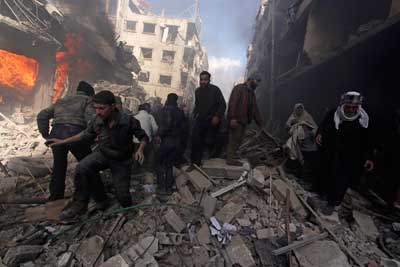It started as a street protest against President Bashar al-Assad. Ordinary citizens took out their smart phones to record the demonstrations that quickly spread. Four years and 220,000 dead later, the Syrian civil war is still raging, although the numbers of ‘citizen’ and professional journalists on hand to document it is woefully small.
And with good reason. Newsgatherers are targets for many sides in the conflict who want to control the narrative. In fact, Syria has become a graveyard for journalists. It has been the deadliest country for journalists for the past three years. More than 81 have lost their lives since the start of the fighting in March 2011 and more than 90 have been kidnapped. Some of those hostages, as we saw last year with the beheadings of James Foley and Steven Sotloff, never made it home.
The carnage has given new urgency for the news industry to examine the way it treats those it hires to bring news from conflict zones.
Many mainstream media companies had already begun implementing rigorous security procedures for staff and reviewing their obligations to local hires during the Iraq war, which took a heavy toll on journalists, particularly Iraqis. The Arab uprisings of 2011 and beyond underscored the dangers of covering fast-moving civil strife and claimed the lives of many experienced international reporters, from Tim Hetherington and Chris Hondros in Libya to Marie Colvin in Syria, as well as dozens of local journalists.
But it was arguably the videos of beheadings by the militant group Islamic State (ISIS) that put a spotlight on the plight of journalists in Syria, especially on freelancers. News organizations, especially those struggling to control costs as traditional business models crumbled, relied heavily on freelance content. Nearly half those killed in Syria are freelancers, a much higher proportion than in other parts of the world.
The beheadings have fuelled debates about U.S. and U.K. hostage policies, the payment of ransom to kidnappers, and the news industry’s penchant for blacking out reporting on the abduction of its own. But the most tangible effect of the new scrutiny has been on the pay, conditions, and preparedness of freelancers.
Freelance journalists were already trying to organize themselves to negotiate better pay, arguing that if they were paid adequately they could ensure their own safety by taking security training, buying safety equipment and insurance, and hiring the best local support staff when on a dangerous assignment.
In conversations with freelancers of all skills and ages around the world it quickly emerges that pay is one of the most determinative factors in safety. Some big newspapers pay as little as 25 U.S. cents a word for copy from a conflict zone or area of unrest. There is no way a reporter can take all the recommended safety precautions for operating in such a zone and make a living at that rate. Some outlets pay as little as US$25 for a still photo from conflict areas.
Independent journalists formed the Frontline Freelance Register to protect their interests. Late last year the FFR, senior news executives, and press freedom and media development organizations got together to establish a foundational set of principles and guidelines for journalists’ safety. These include the recognition that news outlets have a moral responsibility to support independent journalists on dangerous assignments and treat them as they would staff. In return freelancers commit to take safety training.
The Call for Global Safety Principles and Practices launched on February 12, with all the major international wire services and the BBC signing on. Like all negotiated documents, the agreement is a compromise and neither side got everything they wanted. The principles do not address ‘on spec’ work, where freelancers offer content to a news outlet that it has not commissioned. Many independent journalists think this is an area where editors can get the best of both worlds, enjoying access to content without having to take responsibility for its production.
The principles also do not explicitly address solutions for local journalists, for most of whom safety training and equipment are unavailable or unaffordable.
And some news executives are wary about publicly committing to principles which they think could expose them to legal liability.
These concerns were addressed to the satisfaction of some of the world’s leading freelancers and news organizations, but many major broadcasters and newspapers have still not signed on to the principles.
The organizers of the principles are working to change this. We will hold a public event at the National Press Club in Washington, D.C., on April 23 to promote the guidelines and encourage more groups to sign on and implement the principles.
Major broadcast networks, newspapers, and online news services need to join Agence France-Presse, The Associated Press, Bloomberg, the BBC, Reuters, the Guardian, USA Today and others in recognizing that in the news industry post-ISIS, it can never again be business as usual.
